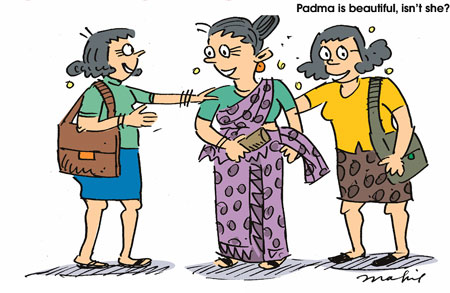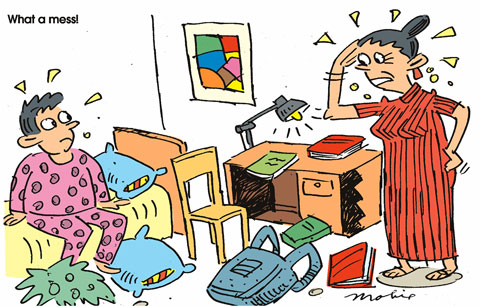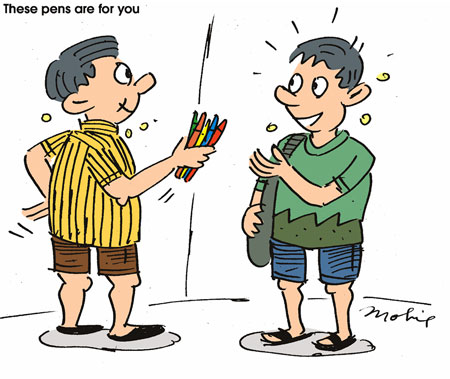|

by R. S. Karunaratne
Punctuation marks
[ Part 4]
Question mark (?)
The question mark or the mark of interrogation is used to end an
interrogative sentence or sentence fragment.
Who are you?
When are they coming home?
Padma is beautiful, isn’t she?
What is your father?

Where do you come from?
When a direct question is being reported, the question mark is not
used.
What are you doing? (Direct question)
He asked me what I was doing. (Reported speech)
We use a question mark when a fact is unverified.
The poetry of William Denwar (? 1948 - ?2001) is very popular.
Mark of exclamation (!)
The exclamation mark is a specialised version of the full stop. It
signals a strong feeling or urgency. It is used at the end of an
emphatic utterance or phrase.
Get out of this place!
How lovely you look!
What a mess!
The use of multiple exclamation marks is not recommended.
An exclamation mark is unlikely to be used in a business letter or
any academic paper. It has no place in technical language.
An exclamation mark is used after interjections or after words that
represent a loud, sharp noise.
Splash!
Boom!
Crash!
Hurray!
Alas!
Good Heavens!
We use an exclamation mark at the end of commands and imperatives.
Don’t move!
Stop!

Halt!
Attention!
We use an exclamation mark at the end of traditional exclamatory
sentences.
How nice of you!
How dare you!
What a fool!
What lovely big eyes you have!
We use exclamation marks for blessings introduced by ‘May’.
May all your wishes come true!
May you be blessed with longevity!
We use an exclamation mark at the end of a warning.
Don’t step on the grass!
Sharp bend!
Slippery road!
No U-turn!
[Activity]
Supply the missing punctuation marks. Check your answers with the
key.
1. were late well have to hurry
.........................................................
2. will you be in tomorrow
..........................................................
3. could you turn the radio down
..........................................................
4. can I have a receipt please
..........................................................
5. in time phrases we normally use these nouns on their own dawn
daybreak sunrise midday noon dusk sunset twilight dark nightfall
midnight
..........................................................
6. the games will be officially opened by queen elizabeth II and
prince philip duke of edinburgh.
...................................................................................................
7. chairman of the ioc medical commission stated there were 9292 drug
tests none positive
...................................................................................................
8. the usa boycotted the games as a protest to ussrs invasion of
afghanistan
...................................................................................................
9. in terms of total medals this was irelands most successful
olympics since melbourne 1956
......................................................................................................
10. survival a single released by the english band muse will be the
official song of the olympics
........................................................................................................
[Key]
1. We’re late, we’ll have to hurry.
2. Will you be in tomorrow?
3. Could you turn the radio down?
4. Can I have a receipt, please?
5. In time phrases we normally use these nouns on their own: dawn,
daybreak, sunrise; midday, noon; dusk, sunset, twilight; dark,
nightfall, midnight.
6. The games will be officially opened by Queen Elizabeth II and
Prince Philip, Duke of Edinburgh.
7. Chairman of the IOC Medical Commission, stated: “there were 9,292
drug tests. None positive.”
8. The USA boycotted the Games as a protest to USSR’s invasion of
Afghanistan.
9. In terms of total medals, this was Ireland’s most successful
Olympics since Melbourne 1956.
10. “Survival”, a single released by the English band Muse, will be
the official song of the Olympics.
Fun with proverbs
Proverbs are a live force in the English language. They are at the
same time popular, pithy and wise. Be familiar with the following
popular proverbs.
1. Don’t tell tales out of school
The proverb that originated among children means that you should not
make public anything that is kept private. A nursery rhyme runs as
follows:
Tell - tale - tit,
Your tongue shall be slit,
And all the dogs in the town
Shall have a little bit.
2. Don’t wash your dirty linen in public
We should not discuss intimate family matters in public especially
when they are of a shameful nature.
3. Dog does not eat dog
Wrongdoers stick together in their fight against society. Another
similar proverb is: “There is honour among thieves.”
4. A door must be either shut or open
You have to make up your mind when it comes to important matters. A
similar proverb is, “You cannot have it both ways.”
5. A drowning man will clutch at a straw
If you are in a desperate situation, you will snatch at any chance,
however slender it may be. The proverb is used in less calamitous
circumstances.
6. A dwarf on a giant’s shoulders sees the farther of the two
If you are a person with little experience, you can add to it the
greater experience of another man. Then you will have the advantage of
the combined experience.
7. Dying is as natural as living
All men are mortal. Therefore, we should not fear death because it is
something natural and inevitable.
8. The early bird catches the worms
This is good advice for those who sleep till late. If you do not get
up early in the morning, you will miss many opportunities.
9. Early to bed and early to rise...
It was Benjamin Franklin who said,
“Early to bed and early to rise,
Makes a man healthy, wealthy and wise.”
10. Easier said than done
It is always easy to give advice than put it into practice. For
instance, many opposition politicians advise the Government on many
matters. However, if they come to power, they will never be able to
practise what they say.
11. East or west, home is best
You can travel all over the world, but you will never find a better
place than home.
12. Easy come easy go
Those who earn money without much effort usually waste it.
13. Empty vessels make the most sound
Empty-headed people are always talkative and noisy. According to a
Dutch saying, one penny in a money-box makes more noise than all the
coins in it when it is full.
14. The end makes all equal
Here “the end” means “death” which makes everybody equal. A similar
proverb is “Death is the great leveller.”
15. Even a worm will turn
If you push a humble person too far, he will retaliate.
Starters:
Use of ‘this, that, these’ and ‘those’
We use ‘this’ and ‘that’ with singular nouns. ‘These’ and ‘those’ are
used with plural nouns.
This
Do you like this book?
This hotel is very expensive.
This is a good school.

I’ve bought this doll for your birthday.
I know this boy’s name.
These
These are my story books.
These flowers are lovely.
These pens are for you.
Do you know these girls?
These were my grandfather’s cufflinks.
That
Do you like that picture?
That is an expensive car.
Who is that man?
Look at that house.
That is a dangerous animal.
Those
Those flowers are lovely.
Those are not my shoes.
Where are those apples you bought?
I know those boys.
Those trees are very tall.
A collective noun and the expression ‘a pair of’ take a singular
verb. We use ‘this’ or ‘that’ with them.
This herd of buffaloes is quite tame.
That pair of spectacles is not mine.
This fleet of ships is coming from China.
That pack of wolves is dangerous.
This bunch of keys belongs to my father.
‘This, that, these’ and ‘those’ point to specific people or things.
This boy is one of my classmates.
That is the man who stole my cow.
Those are rotten apples.
Those cats are very playful.’
This, that, these’ and ‘those’ are demonstrative adjectives when they
are followed by nouns.
This typewriter is beyond repairs.
That animal you keep as a pet is dangerous.
Those tables are donated by a wealthy man.
Those estates belong to a foreigner.’
This, that, these’ and ‘those’ are demonstrative pronouns when they
are not followed by nouns.
This is a new house.
That is a castle.
These are my paintings.
Those are palmyrah trees.
[Activity ]
Fill in the blanks with ‘this, that, these’ and ‘those’. Check your
answers with the key.
1. Look at ................... house across the field.
2. .................. are my books.
3. .................... is my brother’s violin.
4. Nelly wants to play with .................. children.
5. Please ask ............. group of boys to clean the garden.
6. .............. is an expensive pair of spectacles.
7. Could you pass me ............. pile of books.
8. ............... are not my files.
9. Did you make ................. vase that I am holding?
10. ................ potted plants are beautiful.
[Key]
1. that
2. These / Those
3. This / That
4. these / those
5. this / that
6. This / That
7. that
8. These / Those
9. this
10. These / Those
Commonly misspelt words
[Part 2]
The spelling of words may not be logical all the time. Therefore, we
have to make an effort to remember the spelling of certain difficult
words. If you are a bad speller, no one will respect you.
1. Britain
The final vowel is spelt “ai.” Remember the word “certain.”
2. broad
Note the “oa” combination or remember it as “b-road.”
3. bronchitis
Note the “h” after the “c.” The ending is “itis.”
4. bruise
The ending is “uise.” Remember the word “cruise.”
5. buoy:
A big unsinkable object yoked in the sea.There is a “u” before the “o.”
6. buoyant
There is a “u” before the “o.”
7. bureaucracy
The middle vowel is spelt “eau” and the ending is “cy.” Remember the
French word “bureau” meaning “a table.”
8. burglar
The word ends in “ar” not “er.”
9. business
If you start the word with “busi”, you won’t make a mistake.
10. caffeine
The “i” usually comes before the “e” except after “c.” But this is an
exception.
11. calendar
The word ends in “ar”, not “er.”
12. carriage
There is an “i” before “age.” Remember the word “marriage.”
13. catalogue
The word ends in “ogue.” Remember the word “dialogue.”
14. category
The vowel after the “t” is an “e”, not an “a.”
15. cauliflower
The first vowel is spelt “au.”
16. ceiling
The word begins with a “c.” The first vowel sound is spelt “ei.”
17. cellophane
The first letter is “c” and there is a “ph” in the middle of the word.
18. cemetery
All the vowels used in the word are “e”s. It has three “e”s.
19. certain
The final vowel is spelt “ai.” Remember the word “curtain.”
20. choir
Begin the word with “ch” and end it with “oir.”
21. claustrophobia
Fear of being in closed spaces. The first vowel sound is spelt “au.”
There is an “o” before the “ph.”
22. cocoa
The first vowel is “o.” The second vowel sound is spelt “oa.”
23. coconut
There are two “o”s.
24. coffee
There is a double “f” and double “e.” Remember the word “toffee.”
25. competent
The second and third vowels are “e.” Remember the word “compete.”
26. competition
The “p” is followed by an “e.”
27. complexion
The letter after the “e” is “x”.
28. concede
The word ends in “cede.” Remember the word “recede.”
29. conference
The “f” is followed by an “e.” Remember the word “confer.”
30. congeal : to change from a liquid or soft state to a thick or
solid state
The “n” is followed by a “g.” The word ends in “eal.” |

